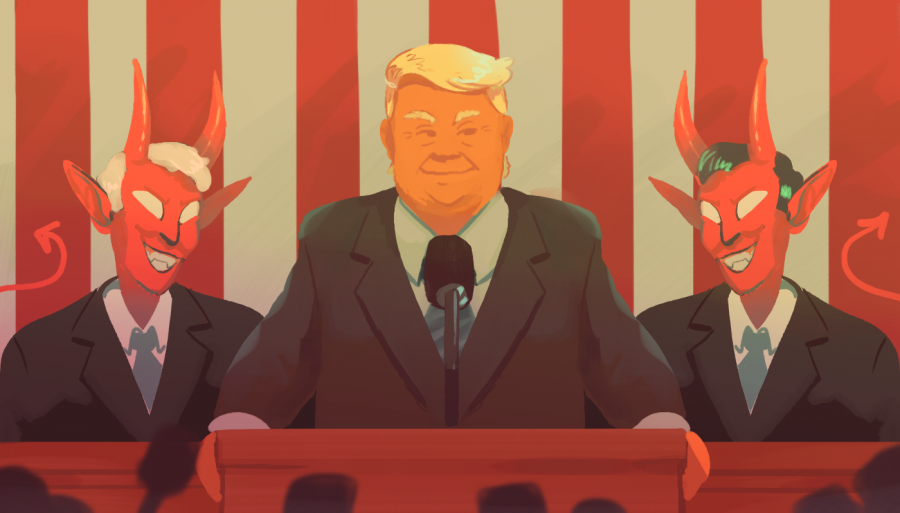Contrary to President Trump’s track record, his first formal address to Congress, Washington D.C. and the country was light on coarse rhetoric and pruned, hate-filled sentences. However, as he left the Congressional floors on Jan. 30 after delivering the final words of his State of the Union—“God bless America. Good night.”—typical to a Trump address, many were left bewildered, confused and perplexed at a few of the twisted points orated.
In his reflection on his past year of presidency, Trump called the state of the Union “strong.” Although we may be strong after tragedy, in normal circumstances I see 50 fractured and disjointed states with more political polarization than ever. This hyper-partisanship and lack of compromise in no way is going to answer any of Trump’s calls to action. While his speech was concerning to say the least, three issues were particularly divisive.
The first of many and probably the most heinous claim Trump made on Tuesday night was in regards to immigration: to scapegoat all immigrants to the same level as MS-13, is down right malicious and only creating a wall of deception.
It is apparent that Trump is ignorant to the means and ways of immigrating to this country. In his State of the Union address—and prior to this too—Trump calls for an end to the lottery system claiming that it “randomly hands out green cards without any regard for skill, merit or the safety of American people.” Fake news.
The diversity visa program selects 50,000 people a year from countries with low immigration rates to the United States, so while it may seem lucky to be chosen, it is not a random decision. All applications go through a vetting process that reviews passports, police and medical records and education and work experiences. Trump’s inaccuracy undermines the program, calling it a system that is lacking merit however, it is a program that grants opportunity for people wanting improve their lives.
Another puzzling statement made that Tuesday night was in regard to energy and “beautiful, clean” coal. “We have ended the war on American energy. And we have ended the war on beautiful, clean coal,” Trump said.
Last I checked, Congress never declared a war on energy and coal was still a dirty pollutant to our planet; clean coal is an oxymoron. While coal production is slowly decreasing, approximately 250,000,000 less short tons were mined in 2016 than 2013. It is decidedly not obsolete.
Coal accounts for the second-largest energy source in the United States, about 30 percent, following close behind natural gas at 34 percent; clean sources such as nuclear energy and renewable energy only account for 20 percent and 15 percent, respectively. If nuclear and renewable energy totaled together barely surpass a top energy source for the country, then Trump has waged a war on the environment. Climate change is an immediate threat to our planet and the “beautiful, clean coal” Trump speaks of only contributes to that problem.
Trump declared that Exxon Mobil announced a $50 billion investment into the United States. Sounds great. However, take this information cautiously. Three weeks ago the administration announced it would allow offshore drilling, removing the ban placed by President Obama. It’s apparent that Exxon Mobil will benefit greatly from a plan that explicitly helps the energy industry, pitting Trump against environmental activists and most definitely not ending the “war on American energy.” In this case, correlation leads to causation.
Following that, another incredulous proposal made by Trump involved increasing the defense spending, for no better reason than to make it “so strong and so powerful that it will deter any acts of aggression by any other nation or anyone else.” According to Trump, no longer do we need a war or act of aggression to build up our military, but it is imperative to constantly maintain an extensive and alluring military just to intimidate our so-called enemies, China and Russia.
In 2017, the United States spent $611 billion on defense, which is the most of any nation and more than the next eight countries combined. Out of the 29 members of the North Atlantic Treaty Organization (NATO), the United States spends almost three times more on defense than the other 28 combined, all of which are our allies. So no, increasing defense spending for no imminent reason is not the most resourceful move. There are more pressing issues at hand.
The State of the Union address leaves the public feeling just as uneasy prior to Trump’s elongated speech. After a boisterous opening and a quintessential America-first message, Trump attempted to soothe over both sides of the aisle by attempting to be bipartisan, but ultimately failed. He leaves more unanswered questions and the State of the Union speech becomes just another feather in the hat of his presidential accomplishments.









